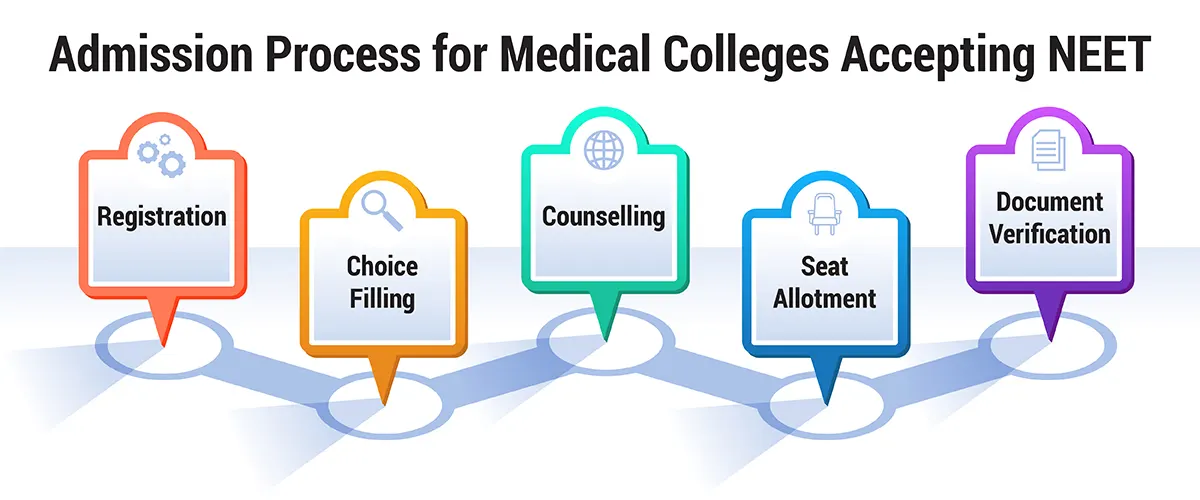In today’s competitive world, securing a seat in a reputable medical college has become a dream for many aspiring doctors in India. With the increasing number of students vying for limited seats, it has become crucial to have a standardized entrance exam that can help filter out the most deserving candidates. This is where NEET (National Eligibility cum Entrance Test) comes into the picture. NEET has emerged as a pivotal exam for medical admissions in India, serving as a common platform for students nationwide.
In this blog, we will delve into the significance of NEET and provide an overview of the medical colleges that accept NEET 2023 scores. So, if you’re planning to pursue a career in medicine, keep reading to learn more about this vital examination and the doors it can open.
- ▪ National Rankings of Medical Colleges
- ▪ State-wise Medical Colleges Accepting NEET
- ▪ Admission Process for Medical Colleges Accepting NEET
- ▪ NEET Counseling and Seat Allotment
- ▪ Document Verification and Admission Formalities
- ▪ Eligibility Criteria for Medical Colleges Accepting NEET
- ▪ Specializations and Courses Offered
- ▪ Faculty and Research Opportunities
- ▪ Rankings and Reputation of Medical Colleges
- ▪ Placement and Career Opportunities
- ▪ Alumni Network and Industry Connections
- ▪ FAQs on List of Medical Colleges in India Accepting NEET 2023
National Rankings of Medical Colleges
When it comes to pursuing a career in medicine, choosing the right college is crucial. With numerous options available in India, students often find it challenging to determine which medical colleges are the best. Thankfully, there are national ranking systems in place that help evaluate the quality of medical institutions across the country.
National Ranking Systems for Medical Colleges in India
To assess the performance and reputation of medical colleges, several ranking systems are employed in India. One of them is: National Institutional Ranking Framework (NIRF)
Initiated by the Ministry of Education, NIRF ranks higher education institutions across various disciplines, including medical colleges. The ranking is based on parameters such as teaching, research, graduation outcomes, outreach, and inclusivity.
Top-Ranked Medical Colleges Accepting NEET Scores (with NIRF Ranking 2023)
NEET (National Eligibility cum Entrance Test) is the common entrance examination for medical aspirants in India. Many prestigious medical colleges consider NEET scores as the primary criteria for admission. Here are some of the top-ranked medical colleges that accept NEET scores:
| NIRF Rank | Name | City | State | Score |
| 1 | All India Institute of Medical Sciences, Delhi | New Delhi | Delhi | 94.32 |
| 3 | Christian Medical College | Vellore | Tamil Nadu | 75.29 |
| 5 | Jawaharlal Institute of Post Graduate Medical Education & Research | Puducherry | Pondicherry | 72.10 |
| 8 | Banaras Hindu University | Varanasi | Uttar Pradesh | 68.75 |
| 11 | Madras Medical College & Government General Hospital | Chennai | Tamil Nadu | 64.43 |
| 12 | King George`s Medical University | Lucknow | Uttar Pradesh | 63.93 |
| 13 | All India Institute of Medical Sciences Jodhpur | Jodhpur | Rajasthan | 62.43 |
| 14 | Vardhman Mahavir Medical College & Safdarjung Hospital | New Delhi | Delhi | 61.73 |
| 15 | Dr. D. Y. Patil Vidyapeeth | Pune | Maharashtra | 61.35 |
| 17 | All India Institute of Medical Sciences Bhubaneswar | Khordha | Odisha | 60.65 |
State-wise Medical Colleges Accepting NEET

State-Wise Breakdown of NEET-Accepting Medical Colleges. The list also includes the top government medical colleges in India through NEET exams.
List of Medical Colleges in Andhra Pradesh Accepting NEET
- Andhra Medical College, Visakhapatnam
- Guntur Medical College, Guntur
- Rajiv Gandhi Institute of Medical Sciences, Kadapa
- Sri Venkateswara Medical College, Tirupati
- Siddhartha Medical College, Vijayawada
List of Medical Colleges in Bihar Accepting NEET
- Patna Medical College, Patna
- Nalanda Medical College, Patna
- Darbhanga Medical College, Darbhanga
- Sri Krishna Medical College, Muzaffarpur
- Anugrah Narayan Magadh Medical College, Gaya
List of Medical Colleges in Karnataka Accepting NEET
- Bangalore Medical College and Research Institute, Bangalore
- Mysore Medical College and Research Institute, Mysore
- Belgaum Institute of Medical Sciences, Belgaum
- Vijayanagar Institute of Medical Sciences, Bellary
- Hassan Institute of Medical Sciences, Hassan
List of Medical Colleges in Maharashtra Accepting NEET
- Grant Medical College, Mumbai
- B. J. Medical College, Pune
- T. N. Medical College, Mumbai
- Government Medical College, Nagpur
- Seth G. S. Medical College, Mumbai
List of Medical Colleges in West Bengal Accepting NEET
- AIIMS, Kalyani
- Institute of Post Graduate Medical Education, Kolkata
- National Institute of Homoeopathy, Kolkata
- Calcutta National Medical College, Kolkata
- College of Medicine and Sagore Dutta Hospital, Kolkata
List of Medical Colleges in Tamil Nadu Accepting NEET
- Madras Medical College, Chennai
- Government Thiruvarur Medical College, Thiruvarur
- Government Mohan Kumaramangalam Medical College, Salem
- Government Vellore Medical College, Vellore
- Government Kilpauk Medical College, Chennai
List of Medical Colleges in Uttar Pradesh Accepting NEET
- King George’s Medical University, Lucknow
- Institute of Medical Sciences Banaras Hindu University, Varanasi
- Aligarh Muslim University, Aligarh
- Sarojini Naidu Medical College, Agra
- Uttar Pradesh University of Medical Sciences, Saifai
List of Medical Colleges in Delhi Accepting NEET
- All India Institute of Medical Sciences, New Delhi
- Vardhman Mahavir Medical College (VMCC), New Delhi
- Lady Hardinge Medical College for Women, New Delhi
- Maulana Azad Medical College, Delhi
- University College of Medical Sciences, Delhi
List of Medical Colleges in Gujrat Accepting NEET
- Maharaja Sayajirao University of Baroda, Vadodara
- B J Medical College, Ahmedabad
- Hemchandracharya North Gujarat University, Patan
- Government Medical College, Surat
- Pandit Deendayal Upadhyay Medical College, Rajkot
List of Medical Colleges in Kerela Accepting NEET
- Government Medical College, Thiruvananthapuram
- Kerala University of Health Sciences, Thrissur
- Kerala Veterinary and Animal Sciences University, Wayanad
- Government Medical College, Thrissur
- Government Medical College, Kannur
List of Medical Colleges in Rajasthan Accepting NEET
- Sawai Man Singh Medical College, Jaipur
- Sardar Patel Medical College, Bikaner
- Government Medical College, Kota
- Government Medical College, Bharatpur
- Rajmata Vijaya Raje Scindia Medical College, Bhilwara
List of Medical Colleges in Madhya Pradesh Accepting NEET
- All India Institute of Medical Sciences Bhopal
- Pt Khushilal Sharma Government Autonomous Ayurveda College, Bhopal
- Government Ashtang Ayurved College, Indore
- Netaji Subhash Chandra Bose Medical College, Jabalpur
- Shyam Shah Medical College, Rewa
The list includes the top government medical colleges in India for MBBS under NEET.
Exploring the Regional Diversity of Medical Education Opportunities:
Southern states like Andhra Pradesh and Karnataka host prestigious institutions such as Andhra Medical College and Bangalore Medical College. Similarly, Northeastern states like Assam provide reputed colleges like Assam Medical College and Gauhati Medical College. Maharashtra and Bihar also house renowned institutions like Grant Medical College and Patna Medical College, respectively.
Regional diversity in medical education enables students to explore various healthcare practices and encounter diverse patient demographics, diseases, and medical challenges. This exposure nurtures adaptability and empathy in future healthcare professionals, empowering them to serve diverse communities nationwide.
Admission Process for Medical Colleges Accepting NEET

Step-by-step admission process for medical colleges accepting NEET scores:
1. Registration: The first step in the admission process is to register for the NEET examination. The registration process is usually conducted online, and aspiring candidates are required to provide their personal and academic details, upload necessary documents, and pay the registration fee. It is important to carefully fill in all the details to avoid any discrepancies in the future.
2. Choice Filling: After successfully registering for the NEET examination, candidates must proceed with choice filling. They are required to select their preferred medical colleges from the list of NEET colleges. It is essential to thoroughly research the colleges, considering factors such as reputation, infrastructure, faculty, and location before making your choices. It is advisable to have a backup list of colleges in case your preferred options are not available.
3. Counselling: The counselling process begins once the NEET results are announced. It can be conducted by the respective state authorities or by the All India Quota (AIQ) counselling, depending on the type of seat you are aspiring for. The counselling process involves online registration, choice locking, and document verification. Candidates are required to pay a counselling fee and submit their documents for verification. It is crucial to keep all the necessary documents ready, such as NEET result cards, mark sheets, identity proof, domicile certificates, etc.
4. Seat Allotment: After the document verification process, the seat allotment process takes place. Based on your NEET score, choices filled, and availability of seats, you will be allotted a seat in a medical college. The seat allotment is usually conducted in multiple rounds, giving candidates an opportunity to upgrade their choices. Once the seat is allotted, candidates are required to accept the seat by paying the necessary fees within the stipulated time.
5. Document Verification: After the seat allotment, candidates need to report to the allotted college for document verification. It is essential to carry all the original documents along with their photocopies. The college authorities will verify the authenticity of the documents, and upon successful verification, the admission process will be completed.
NEET Counseling and Seat Allotment
Let’s discuss the ins and outs of NEET counselling and seat allotment, shedding light on the steps involved, the criteria used, and the role of preferences in securing a seat in NEET colleges in India.
Centralized Counseling Process for NEET-Qualified Candidates
The NEET centralized counselling process is conducted by the Medical Counseling Committee (MCC) for the allocation of seats in medical and dental colleges across India. The counselling process is online, ensuring transparency and ease of access for candidates. The counselling process begins with the registration phase, where candidates need to provide their NEET roll number, personal details, and educational qualifications. Once registered, candidates are required to fill in their choices of colleges and courses based on their preferences.
Seat Allotment Procedure Based on Merit and Preferences
The seat allotment in NEET colleges is based on two primary factors:
- Merit
- Preferences
Merit:
NEET ranks play a significant role in determining the order of seat allocation. Candidates with higher ranks are given priority during the seat allotment process. The MCC releases a merit list based on the NEET scores, which serves as the basis for seat allocation.
Preferences:
Candidates are given the opportunity to choose their desired colleges and courses during the counselling process. The MCC considers these preferences while allocating seats. However, it is important to note that securing a seat in a particular college depends on the availability of seats and the candidate’s merit rank. Therefore, it is essential to carefully select multiple choices to increase the chances of securing a seat. During the seat allotment process, candidates are allotted seats based on their merit rank and the availability of seats in their preferred colleges.
Document Verification and Admission Formalities

Document Verification Process for NEET Counselling:
During NEET counselling, document verification plays a crucial role in ensuring the authenticity of the applicant’s information. The process involves cross-checking the submitted documents with the details provided by the candidate. It helps in confirming the candidate’s eligibility and prevents any fraudulent activities.
The document verification process typically includes the following steps:
a) Online Registration: Candidates are required to register online for NEET counselling and provide their personal and academic details.
b) Document Submission: After successful registration, applicants need to submit the required documents online as per the specified format and guidelines.
c) Physical Verification: Once the online document submission is completed, candidates are called for physical verification at the designated verification centres. This step involves the scrutiny of original documents to verify their authenticity.
d) Verification Acknowledgment: After the physical verification, candidates receive an acknowledgement receipt as proof of successful document verification.
Required Documents and the Importance of Completing Admission Formalities
Here are some of the essential documents that candidates need to submit:
a) NEET Admit Card: It is the hall ticket issued by the National Testing Agency (NTA) and serves as proof of the candidate’s successful NEET examination.
b) NEET Scorecard: The scorecard displays the candidate’s overall and category-wise scores obtained in the NEET examination.
c) Class 10 and 12 Mark Sheets: Candidates need to provide their original mark sheets of Class 10 and 12 as proof of their educational qualifications.
d) Transfer Certificate: It is a document issued by the candidate’s previous school/college, indicating the completion of the previous academic program.
e) Category Certificate: Candidates belonging to reserved categories (SC/ST/OBC) need to submit their valid category certificate issued by the competent authority.
f) Domicile Certificate: Candidates seeking admission under the state quota seats must provide a domicile certificate as proof of their residency in the respective state.
Eligibility Criteria for Medical Colleges Accepting NEET

Let’s explore the eligibility criteria for medical colleges accepting NEET scores:
- Age Limit: NEET has an age requirement of a minimum of 17 years and a maximum of 25 years for General category candidates. However, SC/ST/OBC candidates have a relaxation of 5 years, making the maximum age limit 30 years. Age limits may vary slightly across states, so candidates should check specific requirements of their preferred medical colleges.
- Educational Qualifications: Candidates must have completed 10+2 education with Physics, Chemistry, Biology/Biotechnology, and English as compulsory subjects. They should have a minimum aggregate of 50% (General category) or 45% (SC/ST/OBC categories) in the qualifying examination. The school or college they studied in should be recognized by the central or state government.
- Nationality Requirements: NEET is open to Indian nationals, NRIs, OCIs, PIOs, and foreign nationals. However, foreign nationals need to check specific eligibility criteria set by the medical colleges they wish to apply to.
- Category-Wise Reservations: Medical colleges have reserved seats for different categories such as SC, ST, OBC, and EWS. The percentage of reservations varies across states, so candidates should understand the reservation policies of their target medical colleges. Additional eligibility criteria may apply to candidates belonging to these categories.
Please note that the information provided is a concise summary, and it is recommended to refer to the official guidelines and specific requirements of the medical colleges for detailed information.
Specializations and Courses Offered
NEET colleges across India offer a wide range of medical courses and specializations, catering to the diverse interests and career aspirations of aspiring medical professionals.
Undergraduate programs form the foundation of medical education and are offered in various disciplines.
The most popular undergraduate courses offered are:
- MBBS (Bachelor of Medicine, Bachelor of Surgery)
- BDS (Bachelor of Dental Surgery)
- BAMS (Bachelor of Ayurvedic Medicine and Surgery)
Postgraduate programs, on the other hand, allow students to specialize in specific areas of medicine and gain advanced knowledge in their chosen field such as:
- MD (Doctor of Medicine)
- MS (Master of Surgery) in various specializations including cardiology, radiology, dermatology, and orthopaedics.
Courses like B.Sc. (Bachelor of Science) in Medical Laboratory Technology and B.Sc. (Bachelor of Science) in Nursing integrate medical knowledge with laboratory techniques and nursing skills, respectively.
After clearing the NEET (National Eligibility cum Entrance Test) exams, you can pursue various undergraduate and postgraduate programs in the field of medicine and related disciplines.
Here are some options for both undergraduate and postgraduate studies, as well as interdisciplinary options:
Undergraduate Programs:
- Bachelor of Medicine, Bachelor of Surgery (MBBS): This is the most common undergraduate program for medical studies, focusing on core medical subjects.
- Bachelor of Dental Surgery (BDS): This program is for those interested in dentistry and oral health.
- Bachelor of Ayurvedic Medicine and Surgery (BAMS): It focuses on traditional Ayurvedic medicine and treatments.
- Bachelor of Homeopathic Medicine and Surgery (BHMS): This program explores the principles and practices of homoeopathy.
- Bachelor of Physiotherapy (BPT): It deals with physical therapy, rehabilitation, and related fields.
- Bachelor of Occupational Therapy (BOT): This program focuses on helping individuals with physical, mental, or cognitive disabilities to regain independence.
Postgraduate Programs:
- Doctor of Medicine (MD): These programs offer specialization in various medical disciplines such as internal medicine, paediatrics, dermatology, radiology, etc.
- Master of Surgery (MS): It provides specialization in surgical disciplines like general surgery, orthopaedic surgery, neurosurgery, etc.
- Master of Dental Surgery (MDS): This program offers advanced training and specialization in various dental specialities.
- Master of Public Health (MPH): It focuses on public health policy, administration, and research.
- Master of Pharmacy (M.Pharm): This program offers specialization in pharmacy, pharmaceutical sciences, and related areas.
Interdisciplinary Options:
- Biomedical Engineering: This field combines medicine and engineering principles to develop medical devices, prosthetics, and diagnostics.
- Health Informatics: It deals with the application of information technology in healthcare, including managing medical records and developing healthcare systems.
- Medical Biotechnology: This interdisciplinary field involves the use of biological techniques and principles for medical research, drug development, and diagnostics.
- Clinical Research: It involves conducting research trials and studies to evaluate the safety and efficacy of new treatments and therapies.
- Healthcare Administration: This field focuses on managing and leading healthcare organizations, hospitals, and healthcare systems.
Faculty and Research Opportunities
When it comes to medical education and research, the role of experienced faculty cannot be underestimated.
Importance of Experienced Faculty in Medical Education:
Experienced faculty members play a crucial role in guiding and shaping the future generation of medical professionals.
- With their extensive knowledge and practical experience, they provide students with valuable insights, mentorship, and guidance.
- Their experience not only facilitates a deeper understanding of medical concepts but also equips students with the vital skills needed to excel in their careers.
- Through interactive lectures, case studies, and hands-on training, experienced faculty members create a dynamic learning environment that fosters critical thinking, problem-solving, and clinical decision-making abilities.
Research Opportunities, Collaborations, and Contributions:
Experienced faculty members play a vital role in advancing medical knowledge, discovering innovative treatments, and improving patient outcomes.
- Their research contributions have the potential to shape the future of medicine and revolutionize healthcare practices.
- These faculty members often establish collaborative partnerships with renowned research institutions, hospitals, and medical organizations.
- These collaborations not only enhance the quality of research but also provide students with unique opportunities to participate in cutting-edge research projects. Engaging in research not only expands students’ knowledge but also nurtures their analytical thinking, problem-solving, and research skills.
- Research opportunities also allow faculty members and students to contribute to the scientific community by publishing research papers, presenting at national and international conferences, and receiving prestigious awards and grants.
Rankings and Reputation of Medical Colleges
The rankings and reputation of medical colleges accepting NEET scores can vary based on various factors such as academic excellence, research output, faculty qualifications, infrastructure, clinical exposure, and student satisfaction.
Here are some well-known medical colleges in India along with their general rankings and reputation:
- All India Institute of Medical Sciences (AIIMS), Delhi
- Christian Medical College (CMC), Vellore:
- Maulana Azad Medical College (MAMC), Delhi
- Armed Forces Medical College (AFMC), Pune
- King George’s Medical University (KGMU), Lucknow
- Grant Medical College, Mumbai
- Lady Hardinge Medical College (LHMC), Delhi
- JIPMER, Puducherry
- Madras Medical College (MMC), Chennai
- Seth GS Medical College, Mumbai
It’s important to note that rankings can vary from year to year and different ranking agencies may have different methodologies.
The reputation of a medical college plays a significant role in shaping the career prospects of its students. Here are a few ways in which college reputation impacts a medical student’s career:
a) Quality of Education: Highly reputed medical colleges often have experienced and renowned faculty members who provide exceptional academic guidance.
b) Better Clinical Exposure: Top-ranked medical colleges offer state-of-the-art infrastructure and advanced medical facilities.
c) Research Opportunities: Medical colleges with a strong reputation often invest in research and innovation.
d) Networking and Alumni Connections: Reputed medical colleges attract students from diverse backgrounds, creating a network of talented individuals.
Placement and Career Opportunities

NEET colleges understand the significance of securing placements for their students to kickstart their professional journey. These colleges strive to bridge the gap between education and employment by offering comprehensive placement assistance programs. By developing strong connections with leading healthcare institutions and hospitals, NEET colleges ensure that their students have access to a wide range of placement opportunities.
The placement assistance programs offered by NEET colleges include:
a) Organizing campus recruitment drives: NEET colleges regularly invite renowned healthcare organizations and hospitals to conduct recruitment drives on their campuses.
b) Providing career counselling and guidance: NEET colleges understand the importance of career guidance in shaping the future of their students. Dedicated career counselling cells assist students in identifying their strengths, interests, and career goals.
c) Facilitating internships and fellowships: NEET colleges facilitate internships and fellowships with reputed healthcare institutions, enabling students to gain practical exposure and hands-on experience.
NEET colleges offer a plethora of career opportunities for students post-graduation. Here are some exciting prospects awaiting NEET graduates:
a) Specialization in medical fields: NEET colleges provide a strong foundation in general medicine, enabling students to pursue a specialisation in various medical fields. Whether it’s cardiology, paediatrics, gynaecology, or orthopaedics, NEET graduates have the opportunity to carve a niche for themselves in their desired specialisation.
b) Employment in reputed healthcare institutions: The demand for skilled medical professionals is ever-growing. NEET graduates are highly sought after by renowned healthcare institutions, including hospitals, clinics, and research centres. These institutions value the comprehensive education and practical training received by NEET graduates, ensuring rewarding employment opportunities.
c) Opportunities for research and academia: NEET colleges foster a culture of research and academic excellence. Graduates can explore opportunities to contribute to medical research, either by working in research institutions or pursuing higher education and becoming academicians.
Choosing a medical college that not only provides quality education but also offers robust placement assistance and promising career prospects is crucial for aspiring medical professionals. NEET colleges go above and beyond to ensure that their students are well-equipped to excel in their careers. From comprehensive placement assistance programs to a wide range of career opportunities, NEET colleges open doors to a bright and fulfilling future for their graduates. So, choose wisely and embark on a journey towards a successful medical career.
Alumni Network and Industry Connections

There are numerous benefits of NEET colleges and how they can help students in forging lifelong connections.
1. Extensive Alumni Network: NEET colleges boast a vast network of alumni who have successfully established themselves in various industries. These alumni serve as a valuable resource for current students, offering guidance, mentorship, and even career opportunities.
2. Industry Connections: NEET colleges often have strong ties with industry professionals, experts, and organizations. This translates into a plethora of opportunities for students to network, collaborate, and learn from seasoned individuals within their respective fields.
3. Access to Exclusive Events: NEET colleges frequently organize events, such as alumni reunions, guest lectures, and networking sessions.
4. Mentorship Opportunities: Through alumni networks, NEET colleges often offer mentorship programs where experienced professionals guide students through their academic journey and help them navigate their career paths.
5. Enhanced Job Prospects: Building connections through NEET colleges can significantly improve job prospects. Alumni and industry connections can provide recommendations, referrals, and insider information about job openings.
6. Lifelong Learning and Collaboration: The connections made through NEET colleges can foster a culture of lifelong learning and collaboration. By staying connected with alumni and industry professionals, students can continue to learn from their experiences.
By considering factors such as location, reputation, facilities, and previous year’s cut-offs, students can make informed decisions about the colleges they wish to apply to. NEET 2023 is an important examination that determines admission to medical colleges across the country, and this list serves as a useful resource for applicants. It is recommended that students thoroughly research and consider their choices before finalizing their college preferences. With determination, dedication, and the right information at their disposal, aspiring doctors can embark on a successful journey towards their medical careers.
FAQs on List of Medical Colleges in India Accepting NEET 2023
Q1. What are the top 10 government medical colleges in India under NEET?
Here are the top 10 government medical colleges in India under NEET:
1. All India Institute of Medical Sciences (AIIMS), Delhi
2. Maulana Azad Medical College (MAMC), Delhi
3. Armed Forces Medical College (AFMC), Pune
4. JIPMER, Puducherry
5. King George’s Medical University (KGMU), Lucknow
6. Christian Medical College (CMC), Vellore
7. Lady Hardinge Medical College (LHMC), Delhi
8. Madras Medical College (MMC), Chennai
9. Grant Medical College, Mumbai
10. BJ Medical College, Ahmedabad
Q2. What are the top 10 medical colleges in India through NEET?
1. All India Institute of Medical Sciences (AIIMS), Delhi
2. Christian Medical College (CMC), Vellore
3. Armed Forces Medical College (AFMC), Pune
4. Maulana Azad Medical College (MAMC), Delhi
5. JIPMER, Puducherry
6. King George’s Medical University (KGMU), Lucknow
7. Madras Medical College (MMC), Chennai
8. Grant Medical College, Mumbai
9. Lady Hardinge Medical College (LHMC), Delhi
10. Seth GS Medical College
Q3. Which are the NEET top colleges in India?
The All India Institute of Medical Sciences (AIIMS) in Delhi is widely considered one of the best medical colleges in India. Apart from AIIMS, other renowned medical colleges in India that are often considered among the best include Christian Medical College (CMC) in Vellore, Armed Forces Medical College (AFMC) in Pune, and Maulana Azad Medical College (MAMC) in Delhi.

